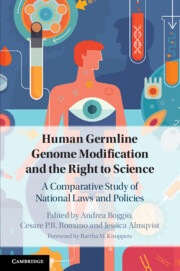 Human Germline Genome Modification and the Right to Science
Human Germline Genome Modification and the Right to Science Book contents
- Human Germline Genome Modification and the Right to Science
- Human Germline Genome Modification and the Right to Science
- Copyright page
- Dedication
- Contents
- Figures
- Tables
- Notes on Contributors
- Foreword
- Preface
- Acknowledgments
- Abbreviations
- 1 Introduction
- 2 The Governance of Human (Germline) Genome Modification at the International and Transnational Levels
- The Regulation of Genome Modification at the National Level
- Part I North America
- Part II Europe
- 6 The Regulation of Human Germline Genome Modification in Europe
- 7 The Regulation of Human Germline Genome Modification in the United Kingdom
- 8 The Regulation of Human Germline Genome Modification in Germany
- 9 The Regulation of Human Germline Genome Modification in Belgium
- 10 The Regulation of Human Germline Genome Modification in Sweden
- 11 The Regulation of Human Germline Genome Modification in the Netherlands
- 12 The Regulation of Human Germline Genome Modification in Italy
- 13 The Regulation of Human Germline Genome Modification in Spain
- 14 The Regulation of Human Germline Genome Modification in France
- 15 The Regulation of Human Germline Genome Modification in Switzerland
- Part III Asia
- Part IV Other OECD Countries
- Part V Conclusions
- Index
10 - The Regulation of Human Germline Genome Modification in Sweden
from Part II - Europe
Published online by Cambridge University Press: 15 November 2019
- Human Germline Genome Modification and the Right to Science
- Human Germline Genome Modification and the Right to Science
- Copyright page
- Dedication
- Contents
- Figures
- Tables
- Notes on Contributors
- Foreword
- Preface
- Acknowledgments
- Abbreviations
- 1 Introduction
- 2 The Governance of Human (Germline) Genome Modification at the International and Transnational Levels
- The Regulation of Genome Modification at the National Level
- Part I North America
- Part II Europe
- 6 The Regulation of Human Germline Genome Modification in Europe
- 7 The Regulation of Human Germline Genome Modification in the United Kingdom
- 8 The Regulation of Human Germline Genome Modification in Germany
- 9 The Regulation of Human Germline Genome Modification in Belgium
- 10 The Regulation of Human Germline Genome Modification in Sweden
- 11 The Regulation of Human Germline Genome Modification in the Netherlands
- 12 The Regulation of Human Germline Genome Modification in Italy
- 13 The Regulation of Human Germline Genome Modification in Spain
- 14 The Regulation of Human Germline Genome Modification in France
- 15 The Regulation of Human Germline Genome Modification in Switzerland
- Part III Asia
- Part IV Other OECD Countries
- Part V Conclusions
- Index
Summary
Sweden can be considered a relatively liberal European country when it comes to research, for example, it allows creating embryos for research purposes; yet, the question of human germline genome modification has been approached with great caution. With the adoption of the Genetic Integrity Act in 2006, the Swedish legislature intended to enable some research relating to gene editing technology while simultaneously placing bans on its use in clinical trials and clinical care, and providing criminal sanctions if these bans are violated. In this way, Swedish law is also aligned with its external commitments, and in particular, the EU Clinical Trials laws. While arguably the Genetic Integrity Act could have effectively functioned prior to the advances in gene editing technology, today it may be regarded as ambiguous and outdated. Hence, risks that ethically contested practices could emerge cannot be excluded. This chapter examines the national laws and policies relating to human germline genome modification in research and in clinical care in Sweden, with due regard to Sweden’s external commitments. Importantly, in light of the ongoing regulatory discussions at the national, European and international fora, it is not obvious that, should European laws become more permissive, and enable human germline genome modification, so would Swedish national law.
Keywords
- Type
- Chapter
- Information
- Human Germline Genome Modification and the Right to ScienceA Comparative Study of National Laws and Policies, pp. 281 - 308Publisher: Cambridge University PressPrint publication year: 2020


